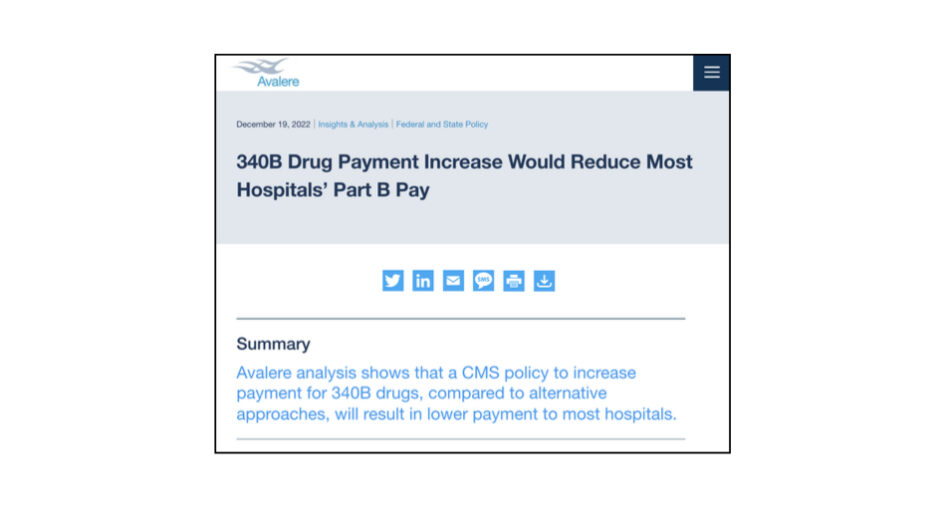Private practice oncologists have paid for a study to model what would happened in 2023 if Medicare paid 340B hospitals for physician administered drugs based on a survey of those hospitals’ drug acquisition costs taken during the COVID pandemic’s darkest days in 2020.
Community Oncology Alliance commissioned Avalere to do the analysis. It corporate members are mainly drug manufacturers and distributors. COA says hospitals’ lower 340B pricing on oncology drugs drives private cancer practices out of business or forces them to merge with hospitals. It says 340B discounts “should follow the patient” and any discounts “that serve to create profit centers for hospitals, which is outside the intent of the 340B program, should be eliminated.”
The study was released Dec. 19, two weeks before Medicare Part B resumes paying 340B hospitals for separately payable, non-pass-through drugs at average sales price plus 6%. The U.S. Supreme Court in June struck down a payment cut for those hospitals to ASP minus 22.5 percent in place since 2018.
In May 2020—when the first wave of COVID-19 was overwhelming hospitals—the U.S. Centers for Medicare and Medicaid Services made 340B hospitals report their net costs for 340B-purchased drugs billed to Medicare Part B during the end of 2018 and beginning of 2019. CMS considered but chose not to base Part B reimbursement for 340B drugs in 2021 on the survey results. It reserves the right to use such a survey in the future. Hospital groups condemned the 2020 survey’s timing and many 340B hospitals boycotted it.
To revert to the ASP plus 6% drug payment rate for 340B hospitals, Avalere says CMS has to make roughly $2.4 billion parallel Medicare outpatient payment cuts to non-drug services to achieve budget neutrality—a cut borne by all hospitals, not just 340B hospitals.
Avalere says if CMS used an alternative reimbursement approach based on its survey of 340B hospitals in 2020, “80% of all hospitals would have received a payment increase that they will now not see due to the finalized policy.”
Specifically, the study found that if CMS were to use the 2020 survey findings and apply a reimbursement rate of ASP minus 28.7% for hospitals’ 340B-acquired drugs rather than the recently finalized ASP plus 6% rate:
- 79% of rural, 82% of urban, and 58% of 340B hospitals would have seen an OPPS payment increase based on 2021 volume.
- 340B sole community hospitals would have seen a 4.3% payment increase.
- 340B rural referral centers would have realized a 2.9% payment increase.
- Payment increases on average would have been at 2.5% for all rural hospitals and 2.9% for all urban hospitals.
The report also concluded that the ASP minus 28.7% payment rate would have had less impact on 340B entities compared with other hospital types, with an average 0.1% decrease overall.
Disproportionate share hospitals (DSH) would have seen a projected payment decrease of 0.9% on average, it said.
The study further found that hospitals with fewer than 100 beds would have realized an average 4% payment increase under the ASP minus 28.7 % formula, facilities with 100-500 beds, a 2.3% increase; while hospitals with more than 500 beds would have seen their payments drop by an average 1.3%.


